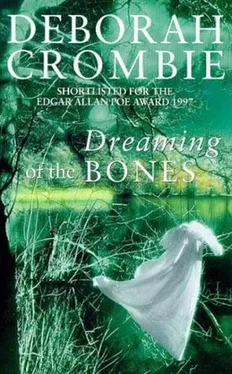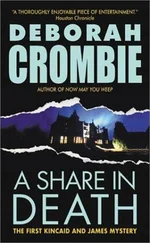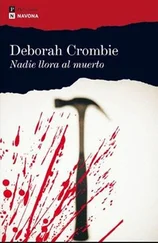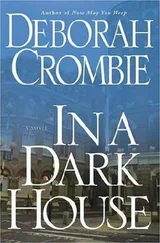Deborah Crombie - Dreaming of the bones
Здесь есть возможность читать онлайн «Deborah Crombie - Dreaming of the bones» весь текст электронной книги совершенно бесплатно (целиком полную версию без сокращений). В некоторых случаях можно слушать аудио, скачать через торрент в формате fb2 и присутствует краткое содержание. Жанр: Детектив, на английском языке. Описание произведения, (предисловие) а так же отзывы посетителей доступны на портале библиотеки ЛибКат.
- Название:Dreaming of the bones
- Автор:
- Жанр:
- Год:неизвестен
- ISBN:нет данных
- Рейтинг книги:3 / 5. Голосов: 1
-
Избранное:Добавить в избранное
- Отзывы:
-
Ваша оценка:
- 60
- 1
- 2
- 3
- 4
- 5
Dreaming of the bones: краткое содержание, описание и аннотация
Предлагаем к чтению аннотацию, описание, краткое содержание или предисловие (зависит от того, что написал сам автор книги «Dreaming of the bones»). Если вы не нашли необходимую информацию о книге — напишите в комментариях, мы постараемся отыскать её.
Edgar Awards (nominee)
Macavity Awards
Dr Victoria McClellan is writing a biography of the tortured poet Lydia Brooke, five years after Brooke's tragic suicide. Victoria becomes immersed in Lydia's life – she cannot believe the poet died by her own hand. So she calls her SI ex-husband for help in the case who receives terrible news…
Dreaming of the bones — читать онлайн бесплатно полную книгу (весь текст) целиком
Ниже представлен текст книги, разбитый по страницам. Система сохранения места последней прочитанной страницы, позволяет с удобством читать онлайн бесплатно книгу «Dreaming of the bones», без необходимости каждый раз заново искать на чём Вы остановились. Поставьте закладку, и сможете в любой момент перейти на страницу, на которой закончили чтение.
Интервал:
Закладка:
“An ambitious man, then? Why would someone like that be willing to throw it all up to run off with a girl?”
“Ambitious only in a small sphere, I think,” said Nathan. He thought for a moment before adding, “I didn’t know the man well. But my guess would be that he’d reached the age where he was finding his own line of goods hard to believe, and he had to either find a less critical audience or reevaluate himself. The former would certainly be easiest.”
Perceptive, thought Kincaid, and, from the little bit that Vic had told him, likely to be true. He sipped at his tea and looked up to find Nathan watching him.
“Why are you here?” asked Nathan. “If you don’t mind my asking. Did Vic talk to you about me?”
“Vic merely said that you were friends. But she also told me a good bit about her biography of Lydia Brooke, and I’ve seen the police report on Lydia’s death, so I know it was you who found Lydia’s body.”
“Ah,” said Nathan. “I wondered how Vic had managed access to the details of the police report, but she didn’t tell me.”
“Did she tell you she had doubts that Lydia’s death was suicide?” Kincaid asked.
“No… no, but I’d begun to guess,” Nathan said slowly, frowning.
“And do you think she had cause to be dissatisfied with the verdict? You were the one who found Lydia’s body, after all.”
“I… I don’t know,” said Nathan, and Kincaid read the uncertainty in his dark eyes. “At the time I simply took for granted that the police had investigated all the possibilities.”
“But what if they didn’t?” Kincaid asked, almost to himself. Then he said abruptly, “Why did Lydia leave everything to her former husband?”
Adam had listened to their conversation with his full attention, but without the body language that indicated he was just waiting a chance to get his oar in. A rare good listener, then, but by nature or training? “What do you think, Adam?” Kincaid said, turning to him. “You were closer to Lydia than anyone.”
“I’m afraid you’re mistaken, Mr. Kincaid,” said Adam with a small smile. “Although I wish I could say otherwise, those days were long past by the time of Lydia’s death.”
“And it never occurred to you that there was anything suspect about Lydia’s death?”
Adam seemed to consider this before answering. “No,” he said finally. “I can’t honestly say that it did.”
“Did you know Vic as well?” Kincaid asked. Vic had written so convincingly about Adam that he felt he knew the man, at least as he had been in those early days with Lydia, and he found it difficult to believe that he would tell a deliberate lie. But would he hedge the truth?
“I only met her once,” said Adam, with what sounded like genuine regret. “When she came to see me about her book.”
“And were you able to help her?”
Adam shrugged. “How can I tell you that? She wanted to know what Lydia was really like, and I did my best. But that is surely a matter of perception as well-perception squared, as it were. Not only might Lydia have behaved differently towards every person with whom she came in contact, but I would then have the option of interpreting her behavior in a multitude of ways.”
“Nicely put,” said Kincaid, grinning. “Were you a student of philosophy by any chance?”
“Philosophy and comparative religion,” admitted Adam.
“Ah, so I was right,” Kincaid said with satisfaction. “I thought I recognized that particular brand of logic.” He returned to the thread of the conversation. “But isn’t that a biographer’s job, to take all those different perceptions of a person and make a cohesive whole of them?”
“But surely that’s an impossible task,” argued Adam. “Because the biographer brings his or her perceptions to it as well, so that it’s never possible to create a true representation of the subject.”
“Vic knew that,” said Nathan. “But the truth is relative, and even a portrait colored by the biographer has its uses. It can enhance our understanding of the artist’s work, as well as our understanding of ourselves.”
Vic . He could hear her speaking in Nathan’s words, hear her intensity, her dedication, and he was caught unawares by the spasm of loss that seized him.
“Truth is not always relative,” he said slowly. “I’ll give you an irrefutable truth, if you like.” Both Nathan and Adam stared at him, as if compelled by something in his voice. “Vic died of heart failure, but not from an unexpectedly weak heart. She was poisoned.”
He watched their eyes, searching for that unmistakable flicker of knowledge, but all he saw was wide and uncomprehending shock.
“You’re not bloody serious,” said Nathan, finally. “That’s not poss-”
“I think Nathan’s been through enough already without this-whatever game this is you’re playing at,” interrupted Adam. His hand had moved to Nathan’s arm in a protective gesture.
“I’m sorry,” Kincaid said. “I wish it weren’t true. But I’ve just come from the police station. The postmortem revealed a lethal amount of digitalis in her body.”
Nathan stood up, knocking the table so that their teacups rattled precariously. He walked unsteadily to the French windows and stood looking out. Beyond him Kincaid could see the garden, designed in a palette of soft grays and greens rather than the bright color Nathan had used in the front. Near the house, a low bed had been formed into the old-fashioned shape of an intricate knot.
When Nathan turned back to them after a moment, his face was ashen. “Could she have taken it accidentally?”
Kincaid shook his head. “That hardly seems likely. She’d never been prescribed any sort of digitalis, nor did she live with someone who might have substituted medications by mistake.”
“But why? Why would anyone do such a thing?”
“I don’t know,” Kincaid said. “All I can tell you is that I intend to find out. And it seemed to me that the logical place to start is with Morgan Ashby.”
“Morgan?” Adam frowned. “Why Morgan?”
“We never got back to the question I asked earlier, did we? Why did Lydia leave her estate to a man she’d been divorced from for more than twenty years?”
“How should I know?” Nathan asked. He shoved his hands in the pockets of his corduroys and started to pace. “Maybe she felt she owed him. They bought the house together, after all. Maybe there was no one else.”
“Or maybe she still loved him,” said Adam quietly. “Their divorce so devastated her that she tried to take her own life.”
“What does it matter?” Nathan said, almost shouting. “And what the bloody hell has it to do with Vic?”
Kincaid pushed his chair back so that he could watch Nathan’s agitated roaming of the room. “Vic told me that when she tried to interview Morgan about Lydia, he was abusive.”
“So?” said Adam. “Morgan was always a bit of a lout. And he hated us especially.”
“Why?” Kincaid asked.
“He was jealous, of course.”
“Jealous of all of you?” Kincaid asked, surprised. “Not just you, Adam?”
Adam glanced at Nathan before he answered. “Well, it was mostly me, I suppose. But he didn’t like any of Lydia’s friends from before… Look, Mr. Kincaid, this has all been a bit much to take in.” He made a slight gesture towards Nathan, who had turned to stare out into the garden again. “Would you mind…”
“I’m sorry.” Kincaid rose. “Before I go, could you tell me how to find Morgan Ashby?”
“He and his wife have an arts studio out west of Cambridge,” said Nathan, without turning round. “Past Barton on the Comberton Road. You can’t miss it. There’s a farmhouse, and next to it a complex of barns painted blazing yellow.”
Читать дальшеИнтервал:
Закладка:
Похожие книги на «Dreaming of the bones»
Представляем Вашему вниманию похожие книги на «Dreaming of the bones» списком для выбора. Мы отобрали схожую по названию и смыслу литературу в надежде предоставить читателям больше вариантов отыскать новые, интересные, ещё непрочитанные произведения.
Обсуждение, отзывы о книге «Dreaming of the bones» и просто собственные мнения читателей. Оставьте ваши комментарии, напишите, что Вы думаете о произведении, его смысле или главных героях. Укажите что конкретно понравилось, а что нет, и почему Вы так считаете.












